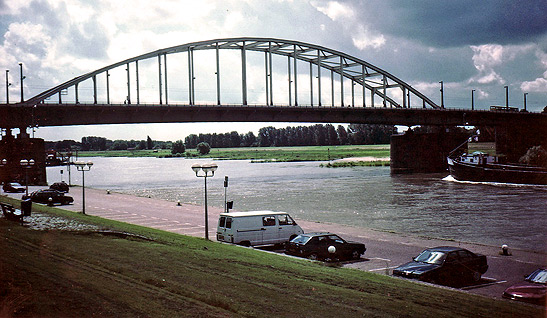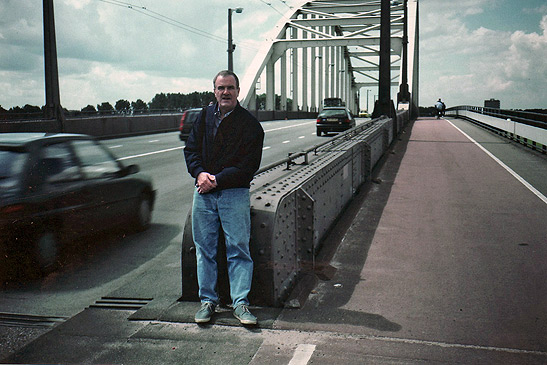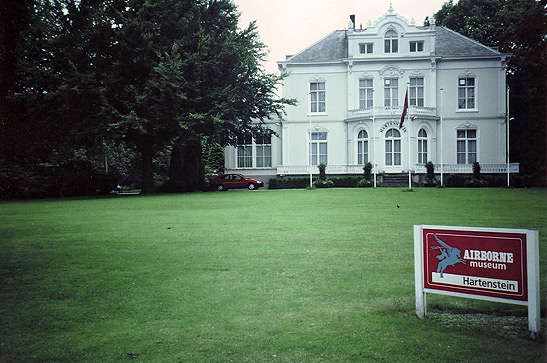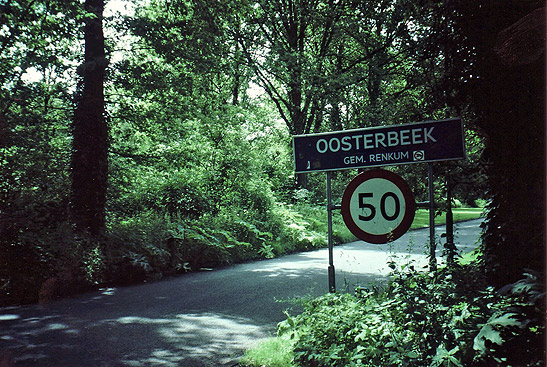|

Is THIS The Most Interesting
Bridge in Europe?
Words and Photos by John Clayton
 ave
you ever seen a movie about some historical event and then, later on,
gone to the places yourself? When you got there did you find it was
as you thought it'd be, or was it all totally different? I mention all
this because longtime listeners to my shows when I was on three top
LA radio stations (and those who have followed my stories on Traveling
Boy) know I'm a real WW2 buff, and that I love visiting many famous
European battleground sites from that now forgotten war. ave
you ever seen a movie about some historical event and then, later on,
gone to the places yourself? When you got there did you find it was
as you thought it'd be, or was it all totally different? I mention all
this because longtime listeners to my shows when I was on three top
LA radio stations (and those who have followed my stories on Traveling
Boy) know I'm a real WW2 buff, and that I love visiting many famous
European battleground sites from that now forgotten war.
One such place is Arnhem in Holland. Anyone who's interested
in some of the more famous battle sites of that era, probably place
Operation Market Garden, and the ensuing battle in and around Arnhem,
in the same category as say the Battle of Britain, or maybe D-Day on
June 6th, 1944. A couple of years ago I was in Germany on vacation with
my wife, and decided that since I was relatively near Arnhem (we were
at Düsseldorf) I'd go see what it was really like.
Driving there along the Autobahn in Germany was a bit
of a challenge because there seemed to be more turnoffs and exits than
I had at first realized, which confused me a bit as regards taking the
correct route to the Netherlands. In fact, when I crossed the border
between Germany and drove into Holland, I was taken aback that I could
do just that - I mean there was no customs house, no gates to shut or
open, and unless I'd seen a sign that said "Welcome to Holland,"
I never would have known I was now in another country. Europe, as almost
everyone knows, is now a virtually border free geographical area.
If you've read this far (!) the question is would YOU
want to visit Arnhem if you were NOT a WW2 aficionado, but just a tourist
visiting the Netherlands? Although I have some reservations in saying
this, the answer is a resounding yes. It is a charming, picturesque
sort of place, tranquil and pleasing to the eye. If you happened to
see the 1977 Joseph E. Levine movie "A Bridge Too Far" about
this epic WW2 event and compare what you saw in the movie, and what
is here today yes, it's even more worthwhile going to this charming
Dutch city.
Operation Market Garden was (I think) a far too hastily
prepared plan to seize numerous bridges over the River Rhine, and then
gain a fast entry into Germany, and so end the war very quickly. Plus
the fact that Allied intelligence (?) disregarded information from the
Dutch Resistance about a recent, large influx of tanks and SS troops
in the area. In the event, it turned out to be a disaster involving
over 84,000 allied troops, of whom nearly 17,000 were either killed,
wounded or missing. The Germans lost around 10,000.
It is my hope that the preceding words and the photos
that accompany this story, intrigue you enough to actually take the
time to visit Arnhem, and see for yourself the various "things"
connected to that famous (or perhaps the word should be "infamous?")
battle of WW2. For a further look at all this, Google words like Arnhem,
Operation Market Garden, Oosterbeek and the Hartenstein Airborne Museum.
And yes, if you do go, send me an email to jdcradio@cox.net
with YOUR comments.

A Bridge Too Far?
This is the so called "Bridge Too Far" from the movie of the
same name. As I stood there I closed my eyes and could hear the gunfire,
the rat-tat of both allied and German guns, and the scene from the movie
where British troops in a house near the bridge, could see all the action
unfolding before them. There is also, at the foot of the bridge, a small
monument and gun from the conflict. Because it was such a glorious day
when I stood there, it was hard, if not impossible, to reconcile that
with the mayhem and murder that took place in September 1944. It all
made me contemplate the large number of soldiers who died trying to
either take the bridge or defend it. In 1978 the bridge was officially
named "The John Frost Bridge" in honor of the 2nd Parachute
Battalion Commander (played in the movie by Anthony Hopkins) who spearheaded
the small advance of British paratroopers to reach it.

A Marvelous Museum
Of all the places in, near and around Arnhem that feature things connected
to Operation Market Garden, this is (in my view) the most interesting
and the most fascinating. It provides an almost "You Are there"
perspective of the battle with life sized models and artifacts from
the battle itself on display. It was this house that was featured in
the closing scenes of the movie "A Bridge Too Far" where the
front lawn is filled with lots of wounded soldiers. It is located near
the center of Oosterbeek, and is a short walk from the railway station.

A Peaceful Reminder
This tranquil scene is, well I guess the word is "opposite"
to the raging, savage, and mind shattering battles that took place here
so long ago. Oosterbeek is home to the Hartenstein Hotel, which dates
back to the 18th century - it was originally a country manor, then a
nursing home and finally a hotel - and now the Airborne Museum. I say
that Oosterbeek is opposite to this serenity, because I also
wanted to see another of the much sought after (and this DOES sound
strange, and almost bizarre) tourist attractions, The Arnhem-Oosterbeek
Cemetery. It is very near this sign and is located in a gloriously peaceful
parkland setting. It contains the graves of 1,678 British and Commonwealth
soldiers, along with 73 Polish and 8 Dutch gravesites, plus some 246
unidentified. It is also the location - in and around and among these
bushes and trees - that both sides' fought an ever increasingly ferocious
battle….all so hard to imagine in the peaceful setting you see
in this photo. Several years ago I talked to a German historian who
regretted that the SS and other German troops in Arnhem had beaten back
the Allies. When I asked why, he said that if the British, American
and Polish forces had indeed won, they would have gone straight on into
Germany as was originally intended. And so dramatically shortened the
war, and changed history.
|



